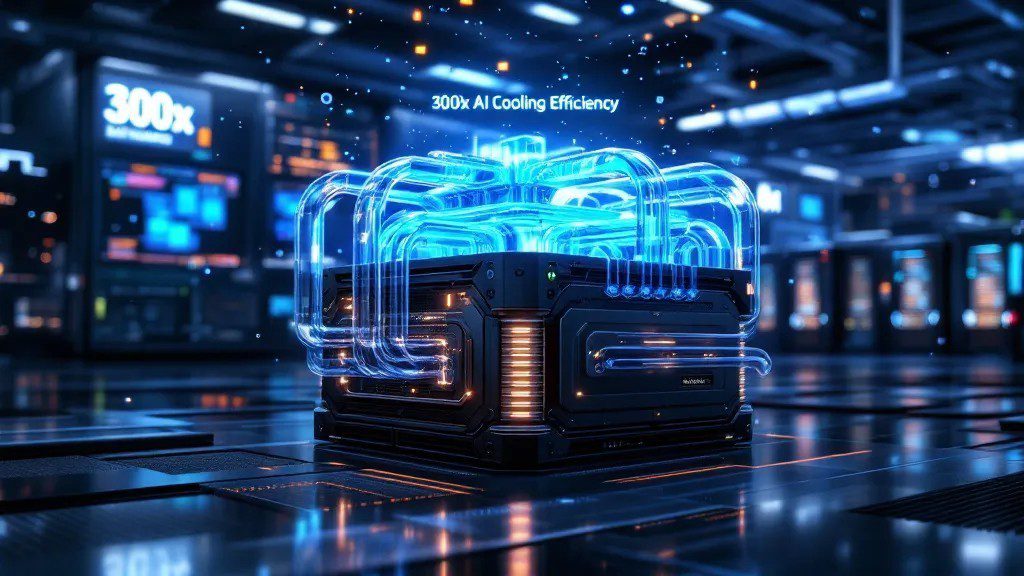NVIDIA has unveiled a revolutionary advancement in AI cooling technology with its Blackwell platform, achieving a remarkable 300x improvement in water efficiency. Announced in 2025, this breakthrough transforms data centre heat management for high-performance AI workloads, significantly reducing reliance on traditional cooling methods while promoting sustainable computing practices.
The platform’s innovative liquid cooling technology directly targets GPUs and CPUs within data centre racks, dramatically reducing the dependency on conventional air conditioning and chillers. This direct approach not only enhances cooling efficiency but also substantially decreases water and energy consumption, addressing critical environmental and operational challenges faced by modern AI data centres.
Central to this advancement is the integration of specialised direct liquid-cooling (DLC) solutions designed specifically for the Blackwell architecture. These systems employ advanced coolant distribution units and innovative coldplate technologies to efficiently manage heat dissipation from NVIDIA Grace CPUs and Blackwell GPUs, enabling optimal temperature control with minimal resource utilisation.
CoolIT Systems’ COO Patrick McGinn emphasised the collaborative effort behind this innovation: “Working closely with NVIDIA and server manufacturers, we are enabling the mass deployment of next-generation GB200 NVL36 and GB200 NVL72 AI platforms with state-of-the-art liquid cooling technology. Our products range from sophisticated coolant distribution units to split-flow coldplates optimised for Blackwell Superchips, supporting both performance and efficiency at scale.”
Lenovo has emerged as a key player in implementing this technology, incorporating open-loop, direct warm-water cooling systems for the NVIDIA GB200 Grace Blackwell architecture. Their ThinkSystem N1380 Neptune servers feature vertical liquid cooling chassis that completely eliminate the need for fans, reducing both power consumption and noise while enabling efficient operation of sophisticated AI models.
The shift from traditional air-based cooling represents a critical evolution in data centre technology. Liquid cooling’s superior thermal conductivity enables more compact and energy-efficient system designs, addressing both the intense heat loads of modern AI hardware and the growing emphasis on sustainability in technology infrastructure.
Key Cooling Methods in a Changing Landscape
Mechanical chillers operate by utilising a vapour compression cycle to cool water, which is subsequently circulated throughout the data centre to capture heat. Typically, these systems are either air-cooled or water-cooled, with water-cooled options often integrated with cooling towers to expel heat. Despite their reliability and effectiveness in various climates, mechanical chillers demand substantial energy, which raises concerns in AI-scale facilities where energy consumption and sustainability are critical issues. The dependence on chillers can markedly influence both operational expenses and carbon emissions.
Evaporative Cooling: Evaporative cooling harnesses the natural process of water evaporation to absorb and eliminate heat. This method can be implemented through direct, indirect, or hybrid systems. Compared to traditional chillers, these systems offer significantly higher energy efficiency, although they do require substantial water usage. In large facilities, water consumption can reach millions of gallons per megawatt each year. However, it’s important to note that their effectiveness is influenced by climate conditions, rendering them less efficient in humid or water-scarce areas.
Dry Coolers: Dry coolers remove heat by transferring it from a closed liquid loop to the ambient air using large finned coils, much like an automotive radiator. These systems don’t rely on water and are ideal for facilities aiming to reduce water usage or operate in dry climates. However, their effectiveness depends heavily on the temperature of the surrounding air. In warmer environments, they may struggle to keep up with high-density cooling demands unless paired with liquid-cooled IT systems that can tolerate higher operating temperatures.
Pumped Refrigerant Systems utilise liquid refrigerants to transfer heat from data centres to outdoor heat exchangers. Unlike traditional chillers, these systems forgo large compressors within the facility and function without water. This approach provides a thermodynamically efficient, compact, and scalable solution, making it particularly advantageous for edge computing deployments and areas with limited water resources. While careful refrigerant management and monitoring are essential, the potential savings in both power and water make this an incredibly beneficial option.
Each of these methods presents unique advantages influenced by factors such as climate, rack density, facility design, and sustainability objectives. As liquid cooling gains traction and servers evolve to function with warmer water, we unlock the potential for more efficient and environmentally sustainable cooling solutions. These advancements not only decrease energy and water consumption but also facilitate enhanced computing performance.
This technological breakthrough arrives at a crucial time as AI applications continue to expand across industries. NVIDIA’s Blackwell platform demonstrates that cutting-edge computing performance can coexist with environmental responsibility, reducing water usage while supporting the growing demands of AI workloads.
Looking forward, the scalability of liquid-cooled Blackwell systems is expected to drive widespread adoption across various IT environments. Ongoing developments in coolant technologies and manufacturing capacity will further facilitate the deployment of high-performance AI infrastructure while maintaining alignment with global environmental standards.
News Source: NVIDIA Blog









